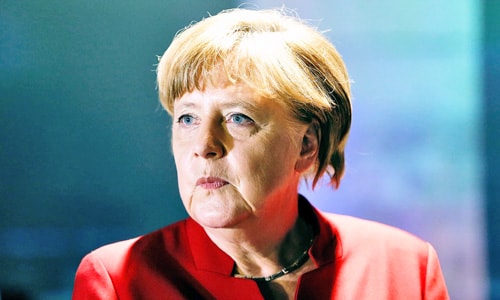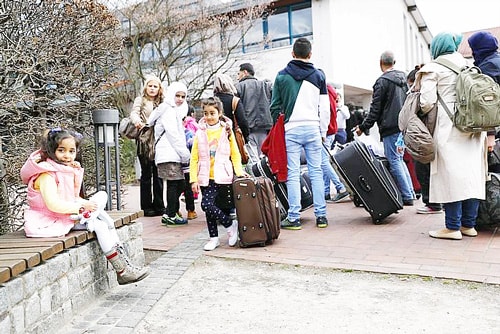The Burden of Compassion
(Baonghean) - A shocking figure just published by German magazine Der Spiegel reveals the burden of the influx of immigrants on Europe's largest economy over the next four years. The huge figure of 93.6 billion euros (equivalent to 105.8 billion USD) can make people doubt that the patience and compassion of the German people are limitless.
 |
| The open-door policy towards migrants is becoming a headache for German Chancellor Angela Merkel. |
Huge expenditure
According to a draft document being negotiated between the German Federal Finance Ministry and the country's 16 states, obtained by Der Spiegel magazine, the expected spending figure includes costs for providing housing, helping to integrate refugees and addressing the root causes of the migration crisis from now until the end of 2020.
This estimate is based on 600,000 migrants arriving in Germany in 2016, around 400,000 in 2017 and 300,000 each year thereafter, and it also assumes that around 55% of legal refugees will be employed after five years.
According to a report by the German Ministry of Finance, the cost of dealing with the migration crisis will gradually increase from now until 2020. Specifically, the spending on these items this year is about 16.1 billion euros, and will increase to 20.4 billion euros in 2020.
The draft also states that over the next four years, the country will spend about 25.7 million euros to support housing, unemployment, and other social services for legal refugees. In addition, activities such as learning foreign languages and finding jobs for refugees will also cost the German government an additional 10 billion euros.
Although still in the discussion stage between the federal government and state governments, these estimates are raising concerns about the division of costs for asylum processing.
This issue is becoming more sensitive in the context of the growing wave of protests against migrants in this country. Currently, the Berlin government of Chancellor Angela Merkel and the state governments have not been able to agree on the costs to deal with the migration crisis due to budget constraints in the states. According to a report by "Der Spiegel", the German states will have to spend 21 billion euros in 2016, and from now until 2020, this number will increase by one and a half times each year.
Do Germans have enough patience?
Of course, it is not entirely accurate to say that the steady influx of migrants into Germany will only create a burden for Europe’s largest economy. The figures do not reflect the true contribution they make to the German economy once they start finding jobs and paying taxes in Germany. Moreover, their presence is believed to bring long-term benefits to Germany’s rapidly aging workforce. This is an undeniable fact.
But critics of the immigration-welcoming policy also have reason to attack Chancellor Angela Merkel about the burden that Germany will have to deal with with the newly revealed projected figures. A series of sexual assaults in Cologne on New Year's Eve tested Germany's patience. Having just become a symbol of conscience for the whole of Europe, Ms. Merkel quickly became a "sinner" in the minds of many people.
 |
| A migrant worker works at a Siemens factory in Berlin. |
This dissatisfaction did not need much time to manifest in the local election results in Germany on March 13. Chancellor Angela Merkel's Christian Democratic Party (CDU) lost to the Alternative for Germany (AfD) and the remaining parties in 3/5 states. This shows that the "Iron Lady of Berlin"'s lenient asylum policy is facing fierce opposition from German voters.
The CDU’s defeat is not only a major challenge for Chancellor Merkel, but it also raises doubts among other EU members about the effectiveness of Europe’s migration strategy, particularly the deal with Turkey. If confidence is lost, Merkel will not succeed in calling for the distribution of refugees to all 28 member states of the bloc.
Looking a little more broadly, it can be seen that a less united and burdened Germany would be a bad omen for Europe. Many years have passed since the Greek debt crisis began to erupt, and the risk of Europe disintegrating is present at the present time. In just a few days, the British people will enter the referendum on leaving or remaining in the European Union.
 |
| Dealing with the needs of migrants is a burden on the German economy. |
Even without the euro, the UK’s departure will still have a huge impact on the continent’s economic and political life, especially in that it could create a bad precedent that divides a united Europe. Alongside the Brexit dangers is a bloc of economies that have not yet been able to escape the specter of crisis to grow strongly. GDP growth is too low even though the European Central Bank (ECB) is still pumping money and has used negative interest rates. A gloomy future is not a factor to convince Europeans to support an optimistic outlook and generous policies.
On the contrary, the huge expenses that Germany will likely have to cover over the next four years are what they are all worried about right now.
Thanh Son
| RELATED NEWS |
|---|








